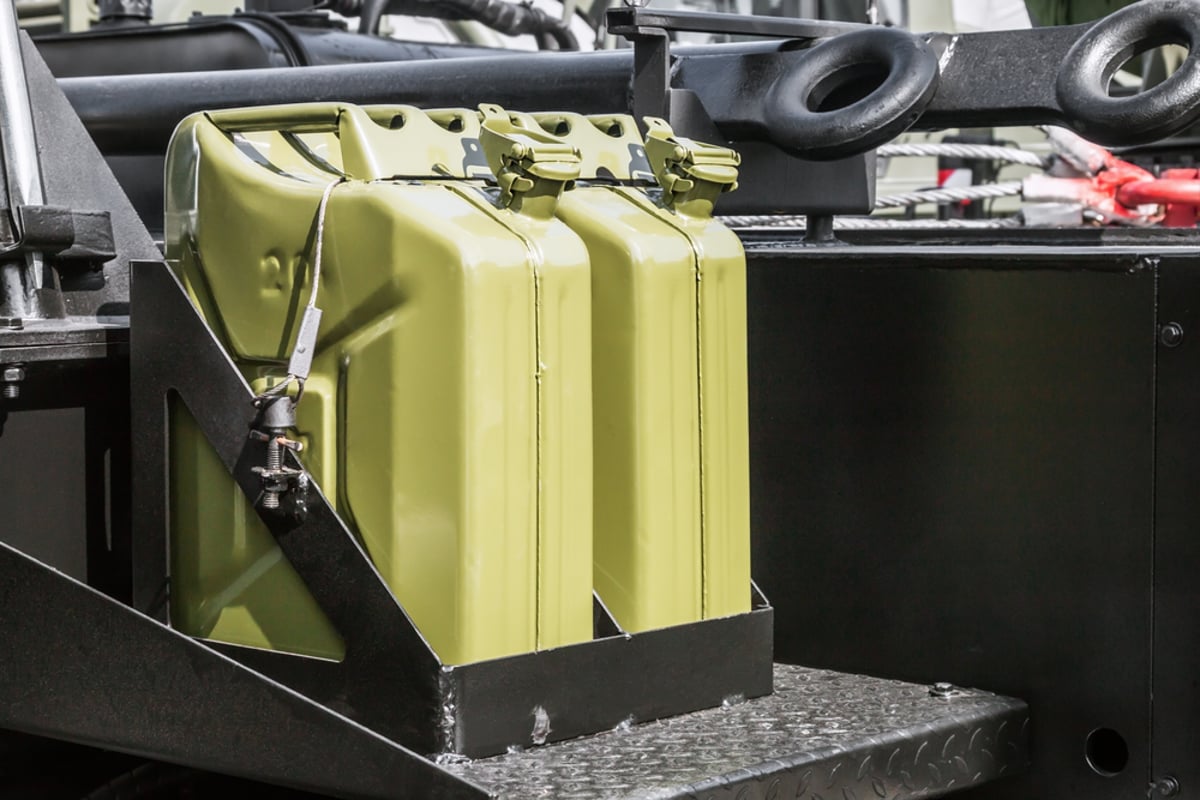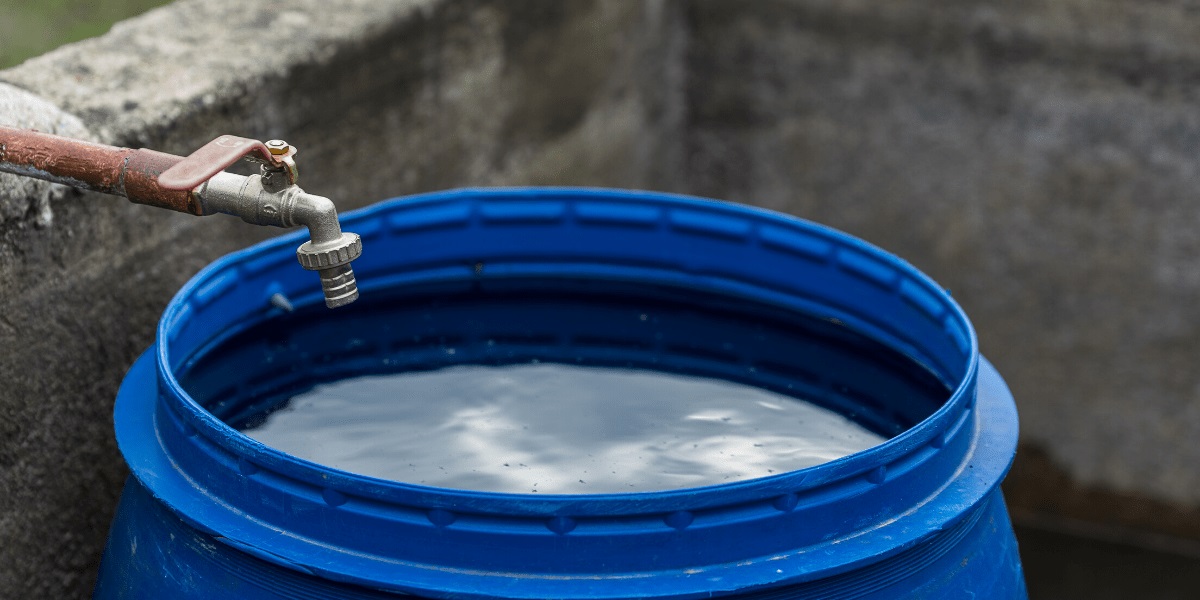

Articles
How To Store Diesel Long Term
Modified: October 20, 2024
Learn effective strategies for storing diesel fuel long term in this informative article. Discover the best practices to ensure optimal fuel quality and longevity.
(Many of the links in this article redirect to a specific reviewed product. Your purchase of these products through affiliate links helps to generate commission for Storables.com, at no extra cost. Learn more)
Introduction
Storing diesel fuel long-term requires proper planning and maintenance to ensure its quality and usability over an extended period. Whether you’re storing diesel for emergency backup, fueling equipment in remote locations, or for personal use, understanding the best practices for storage is essential.
Diesel fuel is widely used in various industries, including transportation, agriculture, construction, and power generation. However, unlike gasoline, diesel fuel has a higher risk of degradation and contamination if not stored correctly.
In this article, we will delve into the key considerations for storing diesel fuel long-term and provide valuable insights on how to maintain its quality and ensure optimal usability.
Key Takeaways:
- Proper long-term diesel fuel storage requires understanding fuel characteristics, choosing the right container, and implementing maintenance practices to preserve quality and performance.
- Regular monitoring, fuel testing, and the use of additives are essential for maintaining diesel fuel quality during long-term storage, ensuring optimal performance and usability.
Read more: How To Store Barley Long Term
Understanding the Characteristics of Diesel Fuel
Before diving into long-term storage methods, it is important to have a solid understanding of the characteristics of diesel fuel. Diesel fuel is a hydrocarbon-based fuel that is derived from crude oil through a refining process. It is commonly used in diesel engines due to its high energy density and efficiency.
One important characteristic of diesel fuel is its susceptibility to degradation over time. Exposure to air, moisture, and contaminants can lead to the formation of sediments, microbial growth, and oxidative reactions, which can negatively impact the fuel’s quality and performance.
Additionally, diesel fuel has a tendency to absorb water over time, which can result in the formation of water-oil emulsions or promote the growth of bacteria and other microorganisms. These issues can lead to fuel filter clogging, engine malfunctions, and reduced fuel efficiency.
Another important factor to consider is the cetane rating, which measures the ignition quality of diesel fuel. Fuels with higher cetane numbers have shorter ignition delays, resulting in smoother engine operation, easier cold starts, and improved overall performance.
Understanding these characteristics is crucial when it comes to storing diesel fuel long-term. By taking measures to mitigate degradation, contamination, and water absorption, you can ensure that your stored diesel fuel remains in optimal condition.
Choosing the Right Storage Container
When it comes to storing diesel fuel long-term, selecting the right storage container is vital. The container you choose should provide a secure and suitable environment for preserving the fuel’s integrity.
There are several options available for diesel fuel storage containers, each with its own advantages and considerations:
- Above-Ground Tanks: Above-ground tanks are a popular choice for storing large quantities of diesel fuel. These tanks are typically made of steel and come in various sizes to accommodate different fuel storage needs. They provide easy accessibility for fuel delivery, inspection, and maintenance. It is important to ensure that above-ground tanks are properly grounded to prevent static electricity buildup and minimize the risk of fire.
- Underground Tanks: Underground storage tanks offer the advantage of space-saving and protection from environmental factors such as temperature variations and UV exposure. They require installation by professionals and may involve higher costs due to excavation and installation requirements. Additionally, regular integrity testing and inspections are necessary to ensure the tank remains in good condition.
- Portable Containers: If you need to store smaller quantities of diesel fuel or require flexibility in moving the fuel to different locations, portable containers are a viable option. These containers are typically made of high-density polyethylene (HDPE) and are designed to be durable, corrosion-resistant, and equipped with a secure lid to prevent spillage and contamination.
Regardless of the type of storage container you choose, it is essential to ensure that it meets all safety and regulatory standards, including those set by your local authorities. This includes proper venting, overfill prevention devices, and secondary containment systems to minimize the risk of spills and environmental contamination.
Ultimately, the right storage container should provide a secure, well-maintained, and contamination-free environment to preserve the quality and usability of your diesel fuel over time.
Cleaning and Preparing the Storage Container
Before storing diesel fuel in any container, it is crucial to ensure that the container is clean and properly prepared to maintain the fuel’s quality. Cleaning and preparing the storage container helps prevent contamination and degradation of the fuel over time.
Here are some important steps to follow when cleaning and preparing the storage container:
- Empty the container: If the container has been previously used to store other substances, it is essential to empty and properly clean it before storing diesel fuel. Any residue left from previous contents can contaminate the fuel and affect its quality. Ensure that the container is completely empty and free from any foreign substances.
- Inspect for damage: Carefully inspect the container for any signs of damage, such as leaks, rust, or corrosion. These issues can compromise the integrity of the container and lead to fuel leakage or contamination. If there are any visible damages, it is best to repair or replace the container before storing the diesel fuel.
- Clean the container: Thoroughly clean the storage container using mild detergents or specialized cleaners specifically designed for fuel storage containers. Use a soft brush or sponge to scrub the interior surfaces of the container and ensure all contaminants, residues, and foreign particles are removed.
- Rinse and dry the container: After cleaning, rinse the container with clean water to remove any remaining cleaning agents or debris. Ensure that the container is completely dry before adding the diesel fuel. Moisture can lead to the formation of condensation and promote microbial growth, affecting the fuel quality.
- Check seals and gaskets: Inspect the seals, gaskets, and other closure mechanisms of the storage container. Ensure that they are intact and in good condition to prevent any fuel leakage or the entry of air, moisture, or contaminants.
By following these steps and thoroughly cleaning and preparing the storage container, you can help maintain the quality and integrity of the diesel fuel during long-term storage. It is recommended to perform regular inspections and cleaning as part of your ongoing maintenance routine to ensure the container remains in optimal condition.
Storing Diesel Fuel in Above-Ground Tanks
Above-ground tanks are a popular choice for storing large quantities of diesel fuel. When properly implemented, they provide a safe and efficient method for long-term storage. Here are some key considerations for storing diesel fuel in above-ground tanks:
- Tank placement: Select a suitable location for the above-ground tank, considering factors such as accessibility, proximity to fueling points, and compliance with local regulations. Ensure that the tank is placed on a stable, level surface that can support its weight and is away from potential hazards like heat sources or areas prone to flooding.
- Tank construction: Above-ground tanks used for diesel fuel storage should be constructed of non-corrosive materials, such as steel with appropriate protective coatings. The tank should be designed and installed in accordance with relevant industry standards and regulations to ensure its integrity and longevity.
- Proper ventilation: Adequate ventilation is crucial for above-ground tanks to prevent the buildup of fumes and pressure. The tanks should have proper venting systems in place to allow for the release of vapors and prevent the formation of a potentially hazardous environment.
- Secondary containment: To minimize the risk of spills and environmental contamination, above-ground tanks should be equipped with appropriate secondary containment measures, such as a double-walled tank or a containment basin. This helps contain any potential leaks and provides an extra layer of protection.
- Regular inspections: Conduct regular inspections of the above-ground tank to check for any signs of damage, corrosion, or leaks. Inspections should include visual checks, testing for water presence, and monitoring fuel levels. Promptly address any identified issues to prevent fuel loss or degradation.
- Fuel filtration: Incorporate a fuel filtration system into the above-ground tank setup to ensure that the fuel remains clean and free from contaminants. Water separators and particulate filters can help remove water and impurities, ensuring the fuel’s quality over an extended period.
- Secure access: Implement security measures to prevent unauthorized access to the above-ground tank. Lockable access doors or gates can prevent tampering or fuel theft, ensuring the integrity and availability of the stored diesel fuel.
By following these guidelines, you can store diesel fuel in above-ground tanks while maintaining its quality and ensuring compliance with safety and environmental regulations. Regular monitoring and maintenance are essential to address any issues promptly and preserve the integrity of the stored fuel.
Read more: How To Store Fabric Long Term
Storing Diesel Fuel in Underground Tanks
Underground storage tanks offer a space-saving and discreet solution for storing diesel fuel long-term. Here are some important considerations for storing diesel fuel in underground tanks:
- Tank selection: Choose a high-quality underground tank designed specifically for diesel fuel storage. These tanks are typically made of corrosion-resistant materials such as fiberglass or double-walled steel. Ensure that the tank meets all relevant industry standards and regulations to ensure its safety and durability.
- Professional installation: Underground tanks should be installed by qualified professionals who are familiar with local regulations and installation requirements. The tank must be placed in a location that meets safety and environmental guidelines, and the installation process should include proper excavation, backfilling, and anchoring to ensure stability.
- Regular inspections: Conduct routine inspections of the underground tank to check for any signs of corrosion, leaks, or other damages. Use specialized equipment to monitor the tank’s integrity, such as leak detection systems or ultrasonic testing. Regular inspections help identify and address any issues before they escalate.
- Secondary containment: Install secondary containment measures to prevent leaks and contain any potential spills. These can include a double-walled tank, outer containment basin, or an underground leak detection system. Secondary containment provides an additional layer of protection and helps mitigate environmental risks.
- Maintenance and cleaning: Implement a regular maintenance schedule for the underground tank. This includes cleaning the tank to remove water, sediments, and any accumulated debris. Utilize specialized tank cleaning equipment and follow industry best practices to ensure the fuel remains clean and free from contaminants.
- Access and security: Take measures to secure access to the underground tank and prevent unauthorized entry. Implement lockable access points and security measures to deter fuel theft or tampering. Restricted access helps maintain the integrity of the fuel and ensures its availability when needed.
- Proper fuel monitoring: Install a reliable fuel monitoring system to track fuel levels in the underground tank. This helps prevent overflows and ensures that an adequate fuel supply is maintained. Automated monitoring systems also provide real-time alerts for fuel leaks or other anomalies.
Storing diesel fuel in underground tanks requires careful planning, professional installation, and regular maintenance. By following these guidelines, you can ensure the safety, longevity, and quality of the stored fuel, while minimizing environmental risks.
Add a fuel stabilizer to the diesel and store it in a cool, dry place away from direct sunlight to prevent degradation. Check the fuel regularly and top it off to minimize air exposure.
Implementing Proper Maintenance Practices
Maintaining proper maintenance practices is crucial for preserving the quality and usability of stored diesel fuel. Regular maintenance helps prevent degradation, contamination, and potential issues that may arise during long-term storage. Here are some important maintenance practices to implement:
- Regular inspections: Conduct routine inspections of the storage container, whether it’s an above-ground tank or an underground tank. Check for any signs of damage, corrosion, leaks, or other issues that may compromise the integrity of the container. Promptly address and repair any identified problems.
- Fuel sampling and testing: Periodically sample the stored diesel fuel and have it tested for quality and contamination. Fuel testing can identify issues such as water content, sediment buildup, microbial contamination, or degraded fuel properties. Based on the test results, take appropriate measures to remediate any problems.
- Water and condensation management: Regularly check for and remove any water or condensation that may have accumulated in the storage container. Water can promote microbial growth, fuel degradation, and corrosion. Use appropriate water separators or other fuel treatment systems to manage water content effectively.
- Filter replacement: Fuel filters play a crucial role in ensuring the fuel remains clean and free from contaminants. Follow the manufacturer’s recommendations and regularly replace fuel filters to maintain optimal filtration performance. Use high-quality filters that are specifically designed for diesel fuel.
- Fuel circulation: Implement a fuel circulation plan to prevent fuel stagnation and stratification. This can be achieved by periodically transferring diesel fuel from the storage container to other equipment or vehicles. Fuel circulation helps ensure uniform fuel quality and prevents issues such as sediment buildup or microbial growth.
- Proper fuel handling: Follow best practices for fuel handling, including using clean and dedicated transfer equipment to minimize the risk of contamination. Avoid exposing the fuel to excessive heat, moisture, or oxygen during the handling process. Keep the fuel storage area clean and free from debris.
- Documentation: Maintain detailed records of maintenance activities, fuel sampling results, and any modifications or repairs made to the storage container. This documentation helps track the history of the fuel storage system and facilitates future maintenance and troubleshooting efforts.
By implementing these maintenance practices, you can ensure that your stored diesel fuel remains in optimal condition and is ready for use when needed. Regular monitoring, inspections, and proactive maintenance go a long way in preserving fuel quality and extending its lifespan.
Monitoring Diesel Fuel Quality
Monitoring the quality of diesel fuel is essential to ensure its performance and usability during long-term storage. Regular monitoring helps identify any issues or degradation that may occur and allows for timely interventions. Here are important steps to consider for monitoring diesel fuel quality:
- Visual inspection: Conduct visual inspections of the stored diesel fuel regularly. Look for any changes in color, clarity, or the presence of sediment or water. These visual cues can indicate fuel degradation or contamination and prompt further investigation.
- Fuel testing: Perform regular fuel testing to assess the quality of the stored diesel fuel. Fuel testing can analyze parameters such as water content, microbial contamination, fuel stability, cetane rating, and overall fuel composition. Testing can be done using specialized fuel testing kits or by sending samples to a certified laboratory.
- Sampling techniques: When collecting fuel samples for testing, ensure that the sampling technique is appropriate to obtain a representative sample. Sampling from different depths within the storage container can help identify any stratification or variation in fuel quality.
- Microbial growth prevention: Diesel fuel is susceptible to microbial growth, especially in the presence of water. Implement preventive measures such as using fuel biocides or additives designed to suppress microbial growth. Regular testing can confirm the effectiveness of these preventive measures.
- Investigate fuel compatibility: If you plan to store fuel for a long duration, verify its compatibility with the storage container materials. Certain types of fuel, especially those containing biofuels, may have compatibility issues with certain storage materials. Consult with fuel and storage experts to ensure proper compatibility.
- Keep records: Maintain detailed records of all fuel testing results, including the sample date, test results, and any actions taken based on the findings. These records provide a valuable historical reference and help establish trends or patterns in fuel quality over time.
- Regular maintenance: Proper maintenance practices, such as regular tank inspections, filter replacements, and water management, play a crucial role in maintaining fuel quality. Monitoring fuel quality should be integrated into the overall maintenance program for long-term storage.
By consistently monitoring diesel fuel quality, you can proactively address any issues that may arise and take corrective actions to ensure the fuel’s performance and longevity. Monitoring should be an integral part of your fuel storage management plan and should be conducted on a regular basis to maintain optimal fuel quality.
Using Fuel Additives
Fuel additives can be effective tools for maintaining the quality and performance of diesel fuel during long-term storage. These additives are specially formulated compounds that are added to fuel to enhance specific characteristics or address common fuel-related issues. Here are some key points to consider when using fuel additives:
- Stabilizing additives: Stabilizing additives are used to prevent fuel degradation and oxidation. These additives inhibit the formation of harmful deposits, gum, and varnish that can clog fuel filters and negatively impact engine performance. Stabilizers help extend the storage life and maintain the fuel’s energy content.
- Biocides: Biocides are additives specifically designed to inhibit microbial growth in diesel fuel. Microbial contamination can lead to fuel degradation, filter clogging, and potentially damage fuel storage systems. Biocides help prevent the growth of bacteria, fungi, and other microorganisms, ensuring the fuel remains clean and free from microbial-induced issues.
- Anti-foaming agents: Diesel fuel can sometimes foam during storage or fueling, leading to inefficient operations, air entrainment, and potential loss of fuel. Anti-foaming agents help reduce foaming, allowing for smoother fueling and reducing the risk of fuel spills.
- Cetane boosters: Cetane boosters are additives that increase the cetane rating of the fuel. Higher cetane numbers improve the fuel’s ignition quality, resulting in better engine performance, improved combustion efficiency, and reduced emissions. Cetane boosters are particularly useful for diesel fuel used in colder climates where easier starting and faster ignition are crucial.
- Water dispersants: Water dispersant additives help break down any water that may be present in the diesel fuel and prevent the formation of water-oil emulsions. By dispersing water, these additives minimize water-related issues such as corrosion, microbial growth, and fuel filter blockages.
- Corrosion inhibitors: Corrosion inhibitors are additives that protect against the detrimental effects of corrosion on fuel storage systems, including tanks, pipes, and fittings. These additives form a protective layer on metal surfaces, reducing the risk of rust and corrosion caused by the fuel or environmental factors.
- Fuel lubricity improvers: Diesel fuel additives can also include lubricity improvers, which help compensate for the lack of naturally occurring lubricity in ultra-low sulfur diesel (ULSD). These additives reduce friction and wear within the fuel system, improving performance and extending the life of fuel system components.
When using fuel additives, it is important to carefully follow the manufacturer’s instructions regarding the correct dosage and application methods. Keep in mind that some fuel additives may have specific temperature and storage requirements, so it’s important to store and handle them appropriately.
Consult with fuel experts or additive manufacturers to determine the most suitable additives for your specific storage conditions and fuel requirements. Regular monitoring of fuel quality and testing can help assess the effectiveness of the chosen additives and guide any necessary adjustments.
Using fuel additives appropriately can help maintain the quality, performance, and longevity of stored diesel fuel, providing peace of mind and ensuring optimal fuel utilization when needed.
Read more: How To Store A Battery Long Term
Best Practices for Long-Term Diesel Fuel Storage
Proper storage techniques are crucial for maintaining the quality and usability of diesel fuel during long-term storage. Here are some best practices to ensure optimal fuel storage:
- Clean and prepare the storage container: Before storing diesel fuel, clean and prepare the storage container to remove any contaminants or residues. Ensure the container is in good condition and properly sealed to prevent fuel leakage and contamination.
- Choose the right storage container: Select a suitable storage container, such as an above-ground tank, underground tank, or portable container, depending on your specific needs. Ensure the container is constructed of non-corrosive materials and complies with safety and environmental regulations.
- Minimize air exposure: Limit the exposure of diesel fuel to air, as it can lead to oxidation and fuel degradation. Keep storage containers tightly sealed and minimize the empty space within the container to reduce the potential for air accumulation.
- Prevent water contamination: Water can negatively impact diesel fuel quality and promote microbial growth. Monitor and prevent water contamination by incorporating measures such as water separators, fuel additives designed to disperse water, and regular inspections to identify and address potential water ingress points.
- Maintain proper fuel temperature: Diesel fuel should be stored at a moderate temperature to prevent excessive evaporation or cold weather thickening. Consider using temperature control devices, such as tank heaters, to maintain the fuel within the recommended temperature range.
- Implement fuel filtration: Use high-quality fuel filters to remove impurities and ensure clean fuel transfer into and out of the storage container. Replace filters regularly and maintain proper filtration equipment to maintain fuel quality.
- Regular fuel rotation: Implement a fuel rotation plan to prevent fuel stagnation and ensure freshness. Use older stored fuel first and replenish the storage container with fresh fuel. This practice helps prevent the fuel from becoming stale or degraded over time.
- Perform routine inspections and maintenance: Regularly inspect the storage container, fuel lines, and other components for any signs of damage, corrosion, or leaks. Implement a maintenance schedule that includes cleaning, testing, and necessary repairs to address any issues promptly.
- Follow appropriate fuel handling and safety protocols: Adhere to proper fuel handling procedures and safety protocols to prevent accidents, spills, and contamination. Store diesel fuel away from open flames, sparks, or sources of heat and ensure that appropriate fire safety measures are in place.
- Keep accurate records: Maintain detailed records of fuel storage activities, including fuel testing results, maintenance tasks performed, and any modifications made to the storage system. These records serve as a valuable reference and help track the fuel’s history and quality over time.
By following these best practices, you can ensure the integrity and usability of diesel fuel during long-term storage. These practices will help you maintain fuel quality, reduce the risk of contamination or degradation, and ensure that the stored fuel remains ready for use when needed.
Conclusion
Storing diesel fuel long-term requires careful planning, proper maintenance, and adherence to best practices to preserve its quality and performance. Whether you are storing diesel fuel for emergency backup, remote equipment fueling, or personal use, following the guidelines outlined in this article can help ensure optimal fuel storage.
Understanding the characteristics of diesel fuel is crucial in implementing effective storage techniques. Recognizing the fuel’s susceptibility to degradation, water absorption, and contamination helps in taking necessary preventive measures.
Choosing the right storage container, whether it’s an above-ground tank, underground tank, or portable container, is essential. These containers should be constructed of non-corrosive materials, properly sealed, and equipped with necessary safety features to prevent leaks, spills, and environmental damage.
Cleaning and preparing the storage container before storing diesel fuel is a critical step. Removing any residue or contaminants ensures the fuel’s integrity and prevents potential fuel system issues.
For above-ground tanks, proper placement, ventilation, and regular inspections are necessary. Underground tanks require professional installation, regular integrity testing, and secondary containment measures to minimize the risk of leaks or environmental contamination.
Implementing proper maintenance practices, such as regular inspections, fuel testing, water management, and filter replacements, helps ensure the fuel remains clean, free from contaminants, and maintains optimal performance. Monitoring diesel fuel quality through visual inspections, fuel testing, and fuel sampling helps detect any issues and allows for timely interventions.
When necessary, using fuel additives can be beneficial in stabilizing the fuel, preventing microbial growth, improving lubricity, and addressing specific fuel-related challenges.
Adhering to best practices such as fuel rotation, maintaining proper fuel temperature, handling fuel safely, and keeping accurate records all contribute to effective long-term diesel fuel storage.
By implementing these strategies and following best practices, you can ensure that your stored diesel fuel remains in optimal condition, ready for use when needed. Regular monitoring, inspections, and proactive maintenance are key to preserving fuel quality, extending its lifespan, and ensuring reliable performance for your diesel-powered equipment or emergencies.
Remember, proper long-term storage practices not only protect your investment but also contribute to environmental sustainability and efficient fuel utilization in the long run.
Frequently Asked Questions about How To Store Diesel Long Term
Was this page helpful?
At Storables.com, we guarantee accurate and reliable information. Our content, validated by Expert Board Contributors, is crafted following stringent Editorial Policies. We're committed to providing you with well-researched, expert-backed insights for all your informational needs.














0 thoughts on “How To Store Diesel Long Term”